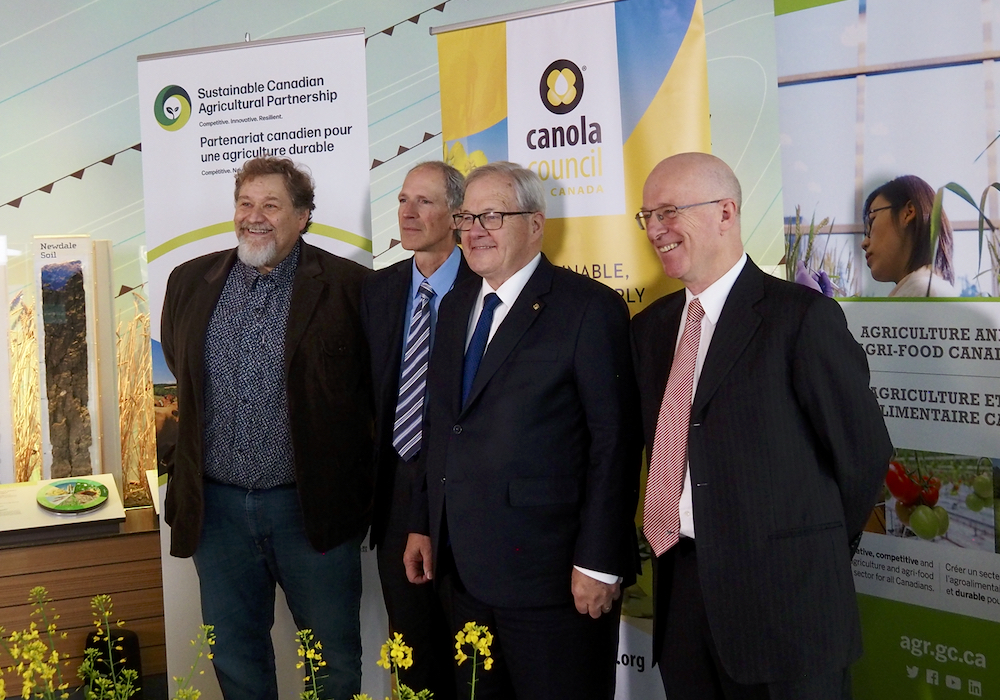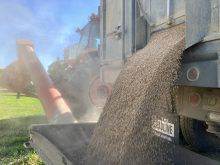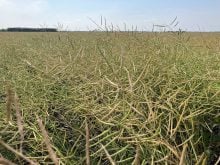The federal government is putting up $9 million in funding to drive sustainable growth of the canola sector.
The money will support a new canola cluster, said Lawrence MacAulay, federal agriculture minister, at a Nov. 14 media event at the University of Manitoba’s Glenlea Research Station.
The 2023–2028 Canola AgriScience Research Cluster follows a similar cluster that ran from 2018.
Read Also

Glufosinate-resistant waterhemp found in U.S. Midwest
Kochia may also be on the road to Group 10 herbicide resistance, which would be a serious blow to Prairie farmers and canola growers, warns weed scientist.
“This new canola cluster will build on the great work of the previous one, which I was proud to announce here a few years ago,” MacAulay said during the event.
“It will support research into improving yields, lowering greenhouse gas emissions, increasing carbon sequestration, improving soil and water quality, and creating new uses for canola.”
The cluster model supports projects intended to mobilize industry, government and academia through partnerships and that address significant national priorities.
For this initiative, the goal is to increase Canada’s canola productivity, help the canola sector meet global demands, and improve the industry’s competitiveness globally, all with an eye to sustainability.
“It brings together industry and scientists to deliver research that meets the needs of hard-working farmers and processors,” MacAulay said.
When contributions from the federal government are combined with those from the Canola Council of Canada, the provincial grower organizations (Alberta Canola, SaskCanola and Manitoba Canola Growers), plus other industry members, total funding for the project will be more than $17 million over five years.
Under this partnership, 17 projects will be carried out in collaboration with public research institutions across Canada.
The projects encompass genetics, crop production, processing and export market research and fall within the four priority areas that the cluster hopes to tackle, which are:
- climate change and environment;
- economic growth and development;
- sector resilience and societal challenges; and
- knowledge and technology transfer and impact assessment.
Mario Tenuta, a soil science professor at the University of Manitoba, heads one of the research projects. Speaking at the media event, he highlighted the impact on agriculture.
“The importance of the S-CAP program in terms of funding cannot be stated enough. It is a tremendous resource, not only to improve the productivity of our crops, such as canola, but also the profitability and efficiency of production for farmers.”
Tenuta is the Senior Industrial Research Chair in 4R Nutrient Management at the University of Manitoba, and his project is looking at 4R precision management of canola.
“We’re collaborating with private industry, with the canola council, with growers, the University of Manitoba, the University of Saskatchewan, and the Indian Head Agricultural Research Foundation,” said Tenuta.
He said it is fairly typical of S-CAP programs to have collaborations between the private sector, farmers, commodity associations and researchers.
“The idea of networking and taking advantage of our collaborative strengths together, I see as being very hopeful for the future of agriculture,” Tenuta said.
Canola council vice-president Curtis Rempel echoed Tenuta’s sentiment.
“Strong collaboration between the public and private sectors is essential,” he said.
Rempel added that these research projects will help the industry become stronger and more resilient by building on 4R nutrient stewardship.
The research will also increase knowledge of canola genetics to more effectively combat pathogens, pests and environmental stressors, which will strengthen economic advantages for growers by improving yields and optimizing inputs, he added.
“It’s a very dynamic time in the industry,” said Rempel. “With increasing global demand for Canadian canola, the opportunities are exciting.”
To realize that potential, Rempel said there is a continued need to invest in research.
“We need to extend the details of these new learnings to the entire value chain to transform knowledge gained into actionable insights.”
MacAulay trumpeted the achievements of the canola industry in Canada, including the $30 billion it generates for the Canadian economy each year and the strides made toward sustainability.
“The global demand for canola seed oil and meal continues to grow,” said MacAulay. “Canola is a story of innovation, and with today’s announcement, we’re continuing to innovate.”
















